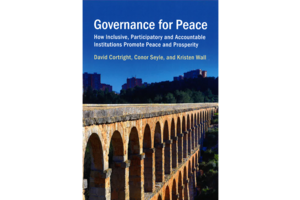
A new book “Governance for Peace: How Inclusive, Participatory and Accountable Institutions Promote Peace and Prosperity” by David Cortright, Conor Seyle, and Kristen Wall, presents a comprehensive analysis of the dimensions of governance that are most likely to prevent armed conflict and foster sustainable development and peace. Cortright and his colleagues give meaning to the concept of ‘good governance’ and explain how inclusive, participatory, and accountable institutions help to reduce violence by addressing social needs and providing mechanisms for resolving disputes. The book emphasizes the importance of both governance capacity and governance quality. While democratic forms of decision-making are important to peace and prosperity, the capacity of governing institutions to deliver public goods equitably to all social groups is equally important in maintaining stability and security. Governance in this analysis encompasses not only the responsibilities of state institutions but also the role of civil society in helping to ensure accountability and inclusiveness in decision-making and public goods delivery. Concepts and topics examined in the book include political legitimacy, human security, the nature of political power, inclusion, accountability, social cohesion, gender equality, countering corruption, democratic participation, development as freedom, capitalism and economic growth, the role of markets and the private sector, China and the 'East Asian peace', the European Union, and global institutions.
About the Authors:
David Cortright is the Director of Policy Studies and the Peace Accords Matrix at the University of Notre Dame's Kroc Institute for International Peace Studies. He has written widely on nonviolence and issues of peace and armed conflict and has provided research services to the foreign ministries of Canada, Sweden, Switzerland and other countries on the use of UN Security Council sanctions. He is the author or editor of twenty books, including Gandhi and Beyond: Nonviolence for a New Political Age, 2nd ed. (Paradigm Publishers, 2009) and Peace: A History of Movements and Ideas (Cambridge, 2008).
Conor Seyle is the Director of Research at One Earth Future Foundation, an operating foundation focused on developing good governance systems for sustainable peace. He is a political psychologist by training, and has published research on the role of non-state actors in atrocity prevention and in on governance, political extremism, and resilience programming. His most recent book, co-edited with John Forrer, is The Role of Business in the Responsibility to Protect (Cambridge, 2016).
Kristen Wall edits scholarship on peace evaluation at George Mason University's School for Conflict Analysis and Resolution and was formerly Program Manager for Policy Studies at the Kroc Institute for International Peace Studies. She has worked in international democratic development in Eastern Europe and currently teaches Montessori peace education. She co-edited with David Cortright and Rachel Fairhurst Drones and the Future of Armed Conflict: Ethical, Legal, and Strategic Implications (University of Chicago Press, 2015).